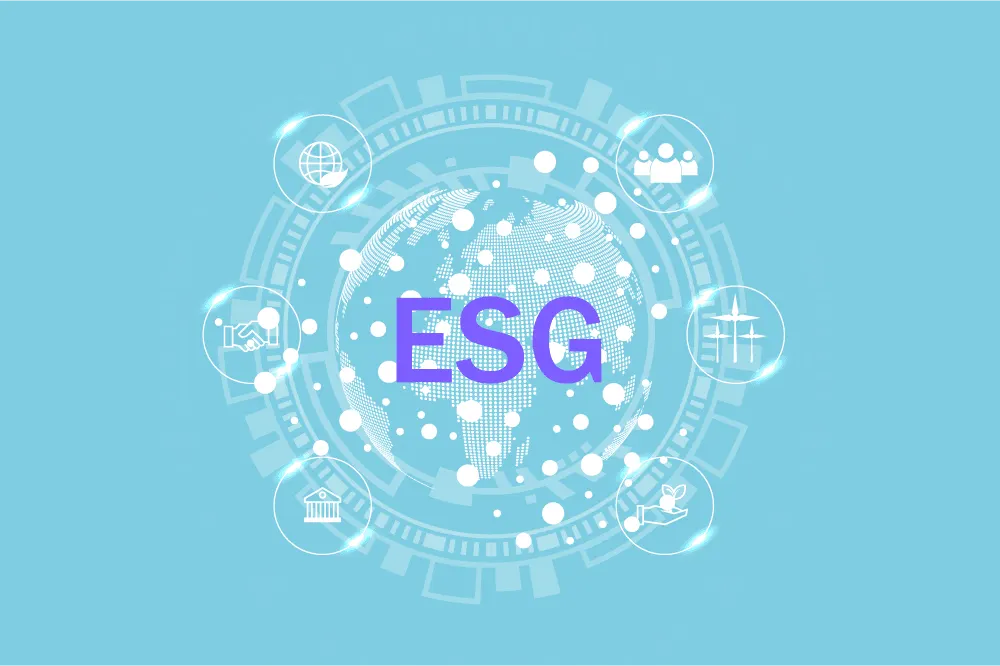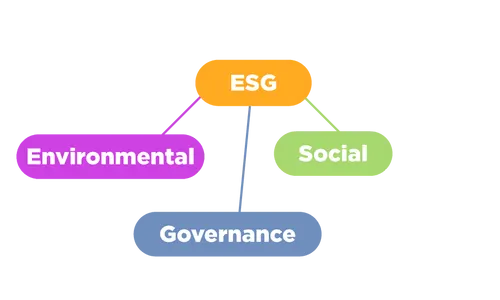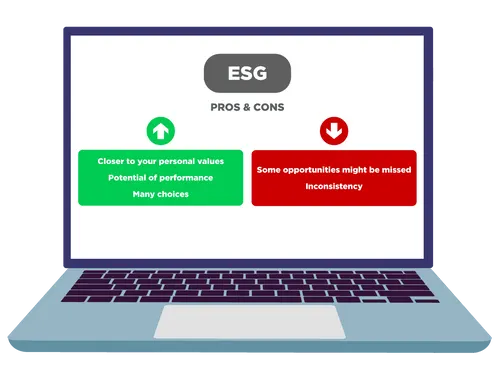Our partner, XM, lets you access a free demo account to apply your knowledge.
No hidden costs, no tricks.

ESG rating is very actively used in the financial industries to measure the exposure of a certain company to long-term environmental, social, and governance risks. These risks include everything from energy efficiency, worker safety, independence of the company, and many others.

All of these things can have some kind of impact on the company's future success, thus, they are pivotal for investors. That said, ESG ratings are rarely discussed during traditional financial reviews and those who use them can have a broader view of the company's future, and long-term potential.
But, how do you get the ESG rating of a certain company? The good thing is, you don’t have to calculate it on your own. There are numerous third-party companies that do this for you, releasing reports on the ESG ratings of different companies.
In this guide, we will discuss the top ESG data providers. So, follow our detailed guide and find out more about them.
ESG, which stands for Environmental, Social, and Governance, has recently become a very popular fundamental indicator in the stock trading market, often used in different stock trading strategies.
ESG Rating Agencies are companies and organizations that work by examining the environmental, social, and corporate governance policies of different corporations to determine how sustainable these corporations are.
By using the findings of ESG data providers, individual investors can go through different types of stocks and find companies that are the most sustainable as well as closer to their individual views.
Almost anyone can use ESG ratings, including retail investors, universities, pension funds, social trading funds, as well as other institutions, when searching for investments that can provide long-term financial stability.
In most cases, ESG rating agencies are hired personally by companies to perform different types of research and analyses of the company's practices. This can be used by companies to change or adjust some of their policies.
The number of ESG rating providers is increasing very fast around the world. According to different sources, there are between 125-600 providers of ESG data. This is mainly due to the huge interest of investors in ESG ratings and rankings.
There are different reasons why someone would use ESG rating providers. For some, it is a great way to measure the positive or negative impact of a certain company on the environment, society, as well as on governance.
This can be used by individuals to determine the possible opportunities of the company in this ever-changing world, and also find out how close or far the company is from their personal views. These three areas provide investors with a great deal of information about the way a company works.
One of the main reasons why ESG providers have become so popular over the past few years is that many institutional investors have started demanding that companies invest in and provide ESG scores before committing any type of capital.
There are several different areas that the rating providers are focusing on. Among them are management of materials, human rights and working conditions, customer relations, and product responsibility among many others.
These ratings can be beneficial for not only investors but the companies as well, as these ratings can be used as a way to determine how they are performing in terms of sustainable practices.
ESG ratings may be used to evaluate whether or not an investment is socially responsible. Also, it can be used to determine which ESG aspects the firm considers when it comes to the influence on society and the environment, which has become more popular among top Chinese stocks.
Individual retail investors do not have to calculate the ESG risks of companies on their own. That is what ESG ratings are there for. Different ESG rating companies are calculating the number in different ways.
For example, some of them are using the rules-based methodology when it comes to calculating ESG for companies, as well as countries, mutual funds, and ETFs. In many cases, ESG is rated on a scale of AAA to CCC according to the exposure of the companies to the risks of ESG.
It also depends on how much the company tries to manage the risks compared to other companies in the industry.
While there are many ESG companies available around the world, it would be wrong to say that all of them provide accurate data. There are some companies that, over the years, have managed to become more reputable in the industry due to their diligence and long experience.
Among those are MSCI ESG Ratings, Bloomberg ESG Disclosures Scores, and many others. We will discuss the top 5 data providers below.

MSCI ESG Ratings provider is one of the most reputable companies available in the market. It was created by MSCI ESG Research, which is one of the largest rating agencies around the world. The ratings of this provider are published for over 14,000 different equity and fixed-income issuers.
MSCI ESG Ratings is one of the best-known providers and a true industry leader when it comes to publishing scores and ratings for ESG companies. Due to the long experience and reputation that this provider has managed to acquire over the past few years, its ratings are trusted by many in the industry.
With over 40 years of experience, this company has managed to become very trustworthy. It rates corporations from CCC, which is the lowest level, to AAA, which is the highest level.
Bloomberg ESG Disclosures Scores is another trustworthy rating system that offers information for over 11,000 companies in more than 100 countries. This provider is focused on many different topics, such as climate change, shareholders’ rights, and many other things.
The ranking of Bloomberg ESG Disclosures Scores ranges from 1% to 99%, with 1 percent being the worst, and 99 percent is the best.
Bloomberg, in general, is a very trustworthy organization that is very well-known around the world. When talking about the comparison of ESG rating agencies, it is safe to say that the Bloomberg ESG Disclosures Scores provider manages to be one of the best options available for investors.
Among the most trustworthy providers, our next suggestion would be ESG Ratings by FTSE Russell. This is a very commonly-used ESG, which is based on the assessment of the company's performance according to ESG standards.
There are over 7,200 securities from 47 countries that FTSE Russell's ESG Ratings analyze. These analyses are conducted methodically. Among the things that FTSE keeps in mind when assessing a certain company are corporate governance, environmental policy, and social policy among others. This provider largely focuses on the FTSE Global Equity Index listed companies.
When establishing a company's ratings, FTSE uses an Exposure-weighted average, which means that the most important ESG concerns are given the greatest weight.
In general, Standard & Poor's Global is viewed as one of the major providers of data analytics around the world. Many ESG scorecards adopt a top-down approach, implying that ESG rankings should be determined by a higher authority.
When it comes to the ESG rating agencies list, S&P Global ESG Scores differs from other ESG rating systems because it employs a bottom-up methodology. The system's purpose is to take the ESG scorecard all the way down to the industry level, where it may influence ESG behavior.
The best stock investors and consumers alike may benefit from their reporting by better understanding ESG risks and possibilities. The scores may be used to offer additional information about a company's ESG score, such as how successfully it works to reduce ESG risks.
Over 11,500 firms' ESG ratings are generated using corporate responses to S&P's ESG questionnaire and/or publicly accessible data. There are around 450 questions in this ESG questionnaire.
While it is true that for many, ESG ranking can be quite important when making a decision about their investments, for others, it simply does not make any difference. Some market experts believe that the ESG score can be very helpful for investors to determine the potential of a certain corporation in the future. However, others believe that very little depends on this score.

Below, we will discuss the major advantages and disadvantages of ESG ratings.
One of the biggest advantages of keeping an eye on a company's ESG ranking is that it can help you find investments that are closer to your personal values. By analyzing ESG scores and rankings, you will be able to find out what the company does to minimize its impact on the environment, how it treats customers, and so on.
ESG ratings can be used by individuals as a way to tell what are the potentials of the investments that they want to make. By analyzing how well a certain company keeps up with developments around the world and how it reacts to different challenges, one can get an idea of the potential performance regarding their investments of choice.
Another huge advantage of ESG investments is that there are numerous options available. We have discussed 4 of the best providers above, but the ESG rating agencies' market share is huge, from penny stocks to giants like Coca-Cola and Meta, and there are hundreds of companies you can find that offer you information about ESG rankings of corporations.
It is true that there are numerous opportunities for ESG investments in the market. However, it should be noted that there is no guarantee that they will perform well. Only focusing on ESG investments can be quite damaging to one's portfolio, as it can exclude investment possibilities that could have been very profitable.
Although it is true that the company's ESG score can be very important for many investors, it can get confusing for some. The main reason for this is that sometimes, the scores tend to be different from some providers.
The main reason for this is that there is almost no regulatory oversight over the ESG score providers. This means that they can be using all types of different methods for coming up with the final score. Thus, the final score can vary with different providers, which can be quite overwhelming for individuals.
Our partner, XM, lets you access a free demo account to apply your knowledge.
No hidden costs, no tricks.
ESG refers to the use of environmental, social, and governance aspects to assess how far firms and governments have progressed in terms of sustainability. These three measures may be included in the investment process when determining which shares or bonds to buy if adequate data has been collected on the company in question. Some of the best ESG data providers analyze different types of data to ensure that their final findings are accurate.
According to official data, there are over 140 different ESG data providers available in the market that are very actively working on analyses and research in a variety of forms to provide investors with accurate market data.
The exact number of ESG rating providers differs according to sources. Some claim that there are almost 600 ESG data providers available in the market. Some of the largest ESG data providers are MSCI ESG Ratings, Bloomberg ESG Disclosures Scores, and FTSE Russell's ESG Ratings, among others.
ESG data providers are using different types of methods to calculate ESG ratings. For example, one of the leading providers, MSCI ESG Ratings uses a rules-based methodology and the rating is from AAA to CCC, with AAA being the highest, and CCC being the lowest rate.